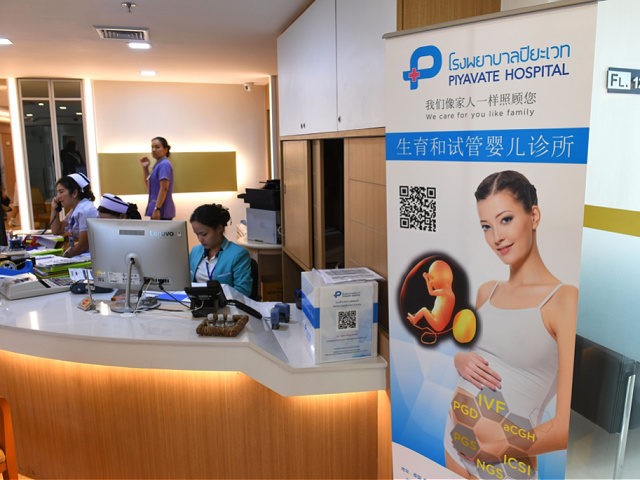China’s state-run Global Times reported on Wednesday that several cities have “ramped up their efforts for the reimbursement of medical bills for fertility services,” including in vitro fertilization (IVF), in China’s latest bid to arrest crashing birth rates.
China’s demographic crisis goes far beyond couples with biological fertility problems, but the Global Times noted infertility rates climbed from 12 percent to 18 percent between 2007 and 2020, presenting a problem that might actually be soluble with policy changes and financial investments.
IVF is expensive, with “costs amounting to tens of thousands of yuan as it often takes multiple attempts to achieve success,” so Chinese municipalities have been reluctant to cover the procedure until now. The capital city of Beijing joined the list of cities offering IVF benefits in 2023, and the big central provinces may follow suit in 2024.
The Global Times reported other aspects of childbirth are receiving more medical benefits as well, including prenatal exams, outpatient care, reimbursement for female employees who need time off for birthing, and subsidies for hospital expenses.
The Global Times naturally threw in a sneer of disdain for “Western media” who have been “quick to warn over an imminent population collapse in China,” but, of course, most of those Western sources are merely reporting the increasingly desperate tone of Chinese official statements and state media articles. The Chinese population is not going to collapse tomorrow, but few doubt China has a very serious problem developing in the years to come.
The Global Times itself floated a theory in July that China’s birth rates are collapsing because neighboring South Korea, which has the lowest recorded fertility rates in the world, has infected Chinese society with “pedophobia,” an irrational fear of children.
The Chinese Communist Party said:
Demographers told the Global Times that lifting up the birth rate is a time-consuming, long-term strategy. Preferential policies, which are just one aspect of achieving a fertility-friendly society, aim to offer extensive support and welfare to individuals who are willing to start a family.
China’s government has launched all sorts of programs to subsidize maternity over the past few years, but none of them have had much of an impact. China severely underestimated how difficult it would be to reverse declining fertility after ending its monstrous “One Child” policy of forced abortions in 2016.
In China, discussing the impact of the “One Child” policy on current demographic trends is severely frowned upon because the government will never admit the policy might have been a mistake, but outside observers contend that preventing millions of young women from being born has cast a long shadow over Chinese demographics.
The Wall Street Journal (WSJ) noted in January that China is pushing women to have babies and offering all sorts of prizes for those who comply, and they are still saying “no.” Dictator Xi Jinping responded by not-so-subtly suggesting that childless women are a threat to China’s social stability.
One Chinese woman told the WSJ she has been badgered by calls from community officials urging her to have more children, and she already has two of them. Another woman who remembered being forcibly implanted with a birth-control device a decade ago under the “One Child” policy now finds herself angrily deleting text messages from officials who tell her to make more babies.
In August, the Chinese city of Xian sent out robocalls on China’s version of Valentine’s Day urging residents to pursue “sweet love, marriage, and childbirth” to create “good fertility” for the nation. The effort was roundly mocked on Chinese social media.
Sociology professor Wang Feng of the University of California at Irvine told the WSJ that “patriarchal policies” are making a big comeback in China, possibly because dictator Xi Jinping and his top officials have concluded feminism was a Western plot to destabilize China by making women less interested in motherhood.
There are no women in the highest ranks of the Politburo for the first time since the turn of the century, and China is slipping fast in the World Economic Forum (WEF) Global Gender Gap report, which would suggest pressure on women to choose motherhood over career.

COMMENTS
Please let us know if you're having issues with commenting.